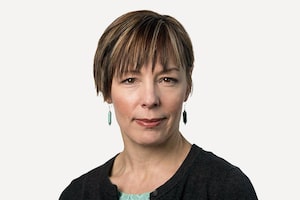People walk between trucks parked near the Parliament Hill, as truckers and supporters continue to protest COVID-19 vaccine mandates, in Ottawa.LARS HAGBERG/Reuters
Police in Ottawa say they are implementing a new hard-line approach toward intractable demonstrations opposed to pandemic restrictions as protesters dig in, and with thousands more expected to arrive this weekend. At the same time, cities around the country are bracing for similar protests.
Chief Peter Sloly announced the force’s plan Friday after a week of disruption. He said an extra 150 officers will be dedicated to patrolling and addressing “unlawful threatening conduct” in downtown neighbourhoods, where protesters are harassing people, damaging property and ignoring traffic laws.
The shift in strategy follows days when residents living in the city’s core have accused the police of abandoning them while taking a lenient stand with protesters.
“This remains, as it was from the beginning, an increasingly volatile and increasingly dangerous demonstration,” Mr. Sloly said, adding that police will support residents and rebuild that shaken trust.
Now, there will be an additional officer on every street corner, said Acting Deputy Chief Trish Ferguson. “Officers have received zero-tolerance enforcement directives with full authority to pursue the strictest possible punishments,” she said.
People work on the roof of a structure being built between Confederation Park and the Rideau Canal as a protest against COVID-19 restrictions continues in downtown Ottawa, on Feb. 3.Justin Tang/The Canadian Press
Last weekend, thousands of demonstrators descended on Parliament Hill and surrounding streets, with truck drivers laying on their horns and protesters on foot waving signs, some with hateful images, and calling for “freedom” from pandemic restrictions and vaccine mandates. Trucks have blocked major intersections and the protests have forced many businesses to close.
Police estimate that last Saturday, there were between 8,000 and 15,000 people in Ottawa. Those numbers dwindled over the week but are expected to increase this weekend, said Deputy Chief Steve Bell. As of Friday, he said, there were between 200 and 250 trucks blocking streets. Another 300 to 400 trucks and up to 2,000 protesters on foot are expected to arrive by Saturday. Police are anticipating counter protests, but since the news conference, at least one has been cancelled.
Chief Sloly said police will also “harden” the perimeter around the core demonstration near Parliament Hill by installing concrete barriers to block access to roadways downtown. Interprovincial bridges, highway off-ramps and roads will also be closed as needed, he said. And incoming protester vehicles on Friday and throughout the weekend will be directed to designated parking zones outside of the city’s core.
At a news conference after a virtual meeting of Premiers, Ontario’s Doug Ford called on the protesters in Ottawa to leave. “Regarding Ottawa, the occupation – it’s not a protest any more, it’s become an occupation – it’s only hurting families. It’s hurting businesses that these folks are supposed to be supporting. But it’s hurting businesses in a big way.”
Mr. Ford also said he has “all the confidence in the world” in Toronto police as they wait for demonstrators to descend on that city. “Any harassment, or acts of hatred, or acts of violence, we will have zero tolerance, absolutely zero tolerance.” He said he has offered the mayors of Toronto and Ottawa assurances that the provincial government will provide additional resources if needed.
Trucks and farm vehicles set up near Manitoba legislature to protest COVID-19 restrictions
Saskatchewan legislature closes to public ahead of Saturday’s trucker convoy
When asked if he would condemn the protests expected in Regina, Saskatchewan Premier Scott Moe said: “All Canadians do have the right to protest. However, they do have that right to protest peacefully and within the confines of the law that we have.”
B.C. Premier John Horgan, who held the meeting, said the premiers had a “comprehensive” discussion about the protests. He also said “when your desire to have your voice be heard starts to interfere with the lives of other people, that’s when lines are drawn.”
Manitoba Premier Heather Stefanson said because of planned protests at her province’s legislature, staff were asked to work from home until it is safe to return.
Toronto police block off downtown roads near hospitals as trucker convey offshoot to roll in
Quebec City ready for trucker convoy protesting COVID-19 health orders, Legault says
Police forces across the country are hoping to learn from the experience in Ottawa to avoid the protracted protests under way in the capital. Friday marked Day 8 and protesters showed no sign of going anywhere soon.
On Friday in Confederation Park, demonstrators stood around a newly built wooden structure, where they were cooking and handing out food. On Lyon Street., a large truck was stocked with boxes of chips, stacks of toilet paper, and installed beside it were two pizza ovens. A block away on Kent Street., a sign reading “Nurenberg Now!” was staked into a tall snow bank. The Nuremberg trials took place after the Second World War, where Nazi officers were tried and hanged.
Further north, on Wellington Street, beside Parliament Hill, protesters appeared to be setting up bouncy castles and a few blocks east, a dance party was under way.
Video from CTV shows protesters consulting with police on where to go with their fuel and police pointing out the direction. Despite that, Chief Sloly said police are not facilitating the protesters.
Chief Sloly said it was a policing success that the numbers of protesters has shrunk and that no riots have broken out, but he acknowledged that police do not know when the demonstrations will end. The protesters “remain highly organized, well-funded, extremely committed to resisting all attempts to end the demonstration safely,” he said.
Plywood covers a window at the Happy Goat Coffee shop on Elgin Street after it was broken by vandals overnight in Ottawa, Thursday, Feb. 3, 2022.Justin Tang/The Canadian Press
Residents have said they feel that they have been taken hostage.
Catherine McKenney, a city councillor for the downtown who uses they/them pronouns, said they are being inundated with reports of threatening behaviour, harassment and violence. Women wearing masks outside have been followed and verbally abused, and Mx. McKenney said they had to get police to escort a couple out of their home with a rainbow flag in their window after protesters started yelling at them, threw things at their building and defecated on the front step.
“It was violent and people were being terrorized by the noise and just by the presence of very large trucks and very threatening behaviour,” Mx. McKenney said. “Residents downtown were abandoned until today.”
Late Friday, CTV reported that organizers of the protest dubbed the “Freedom Convoy” are facing a potential $9.8-million class-action lawsuit over continuous vehicle horn noise.
Mx. McKenney said it is unacceptable that it took until Thursday for Ottawa to ask for more support from the federal government and for the RCMP to promise more officers. Mx. McKenney said they will know that the new policing plan has worked if their e-mail stops being flooded with residents frightened and reporting illegal behaviour.
Deputy Chief Bell said unlike other protests on Parliament Hill, this one spread into the neighbourhoods around it. “20/20 hindsight, if we knew that it was going to actually seep into the neighbourhoods, we would have deployed more resources into those neighbourhoods,” he said.
“We’ve listened to our community. They’re upset. They’re fearful. We are there now to absolutely protect them and restore safety and security in the neighbourhoods.”
When asked how police intend to rebuild trust with Ottawa residents, Chief Sloly said he empathizes with those who have endured unacceptable violations. He said the police are committed to doing better.
He also underscored the level of organization, funding and commitment of the protesters. He said police have found at least two operation centres in the city and that funding is coming in locally, nationally and internationally and police are trying to cut off support.
For subscribers: Get exclusive political news and analysis by signing up for the Politics Briefing.
 Janice Dickson
Janice Dickson Marieke Walsh
Marieke Walsh Justine Hunter
Justine Hunter